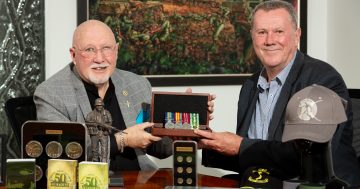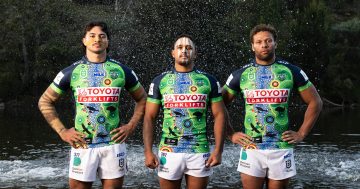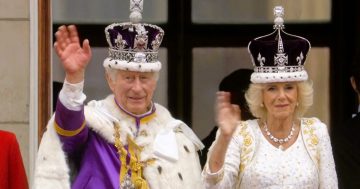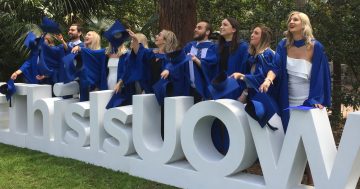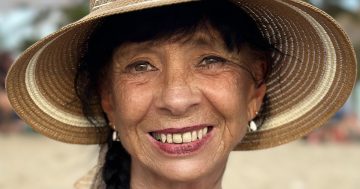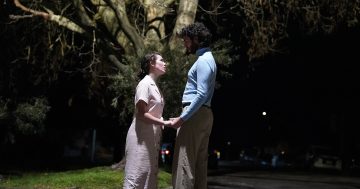
Bombardier John Burns of Holland Park, Queensland, left, with Gunner Bruce Morris of Morwell, Victoria, take a break next to a 105mm Howitzer during Operation Toan Thung in Vietnam. Photo: The Australian War Memorial.
When it comes to collecting stories about our Indigenous veterans, Michael Bell usually only gets to track down second or third-hand versions.
There are few veterans of World War I, World War II and the Korean conflict still around today to give first-hand accounts of what it was really like, what they experienced and what war took from them.
That is, until now.
Mr Bell, a Ngunnawal/Gomeroi man, is the Australian War Memorial’s Indigenous liaison officer. It’s his role, and his passion, to research and identify Aboriginal and Torres Strait Islander people who served their country during wartime.
He’s now researching the Vietnam War, a conflict that split many Australians, but has proved quite the contrary for Mr Bell.
Helped by his team of volunteers across the country, he has identified 250 Indigenous men and women who fought in Vietnam from 1955 to 1975. Because the war ended almost 50 years ago, many of the servicemen and women are still around to tell their stories, tales Mr Bell wants to record for the Australian War Memorial (AWM) collection. And this research, he says, tells a lot about all Australians of the day.
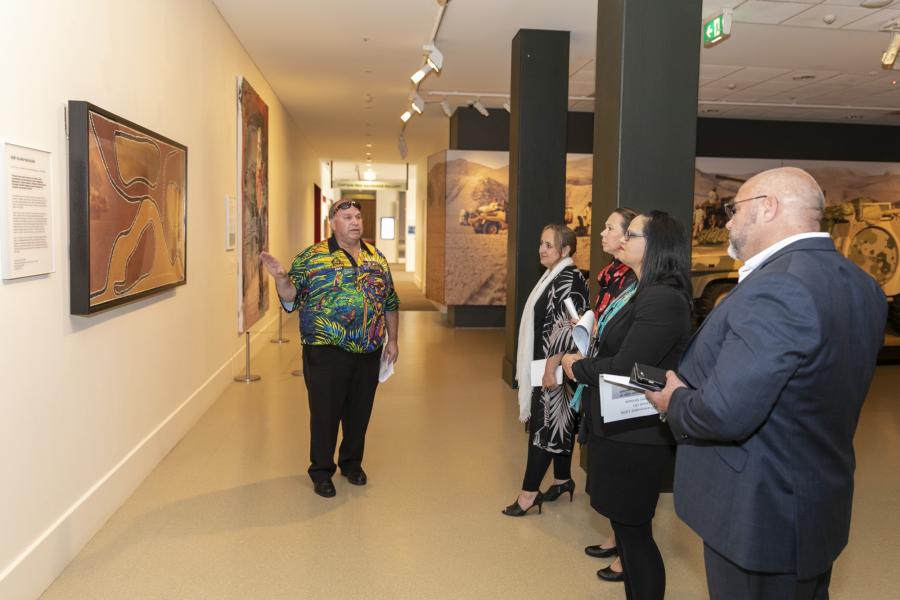
Indigenous liaison officer at the Australian War Memorial, Michael Bell, shows off some of the collection to visitors. Photo: Australian War Memorial.
It includes a recruitment poster for 1971 which lists Aborigines as exempt from enlisting.
“Aboriginality was seen as a reason not to serve, but many still did,” Mr Bell said. “This reflects the willingness of our men and women to serve.
“We now have a great opportunity to meet with many surviving veterans and to speak to them directly and have their stories recorded.
“We can ask veterans why they volunteered to enlist, we can gather stories on the racial tensions at the time, and the equality or inequality they may have experienced.”
One of the stories he has been told, more than once during the research process, offered great insight into the character of the Aboriginal and Torres Strait Islanders. Although exempt from conscription, he said, when your number came up, it came up. “You’d have to take your letter to the enlistment office and they would process you,” he said.
“If the recruiters said you weren’t required because you were Aboriginal, some of them walked out of the office and came back though a different door, saying they wanted to volunteer.
“It was all about being with their mates, doing their duty, that’s what they said. They weren’t going to let their Aboriginality deny them that.”
Mr Bell said it had been “a pleasure” to be able to talk to the veterans about their experiences. “I can ask them things I couldn’t ask the others,” he said. “They all seem happy to talk to me about their service, saying it’s about time they were given the opportunity.”
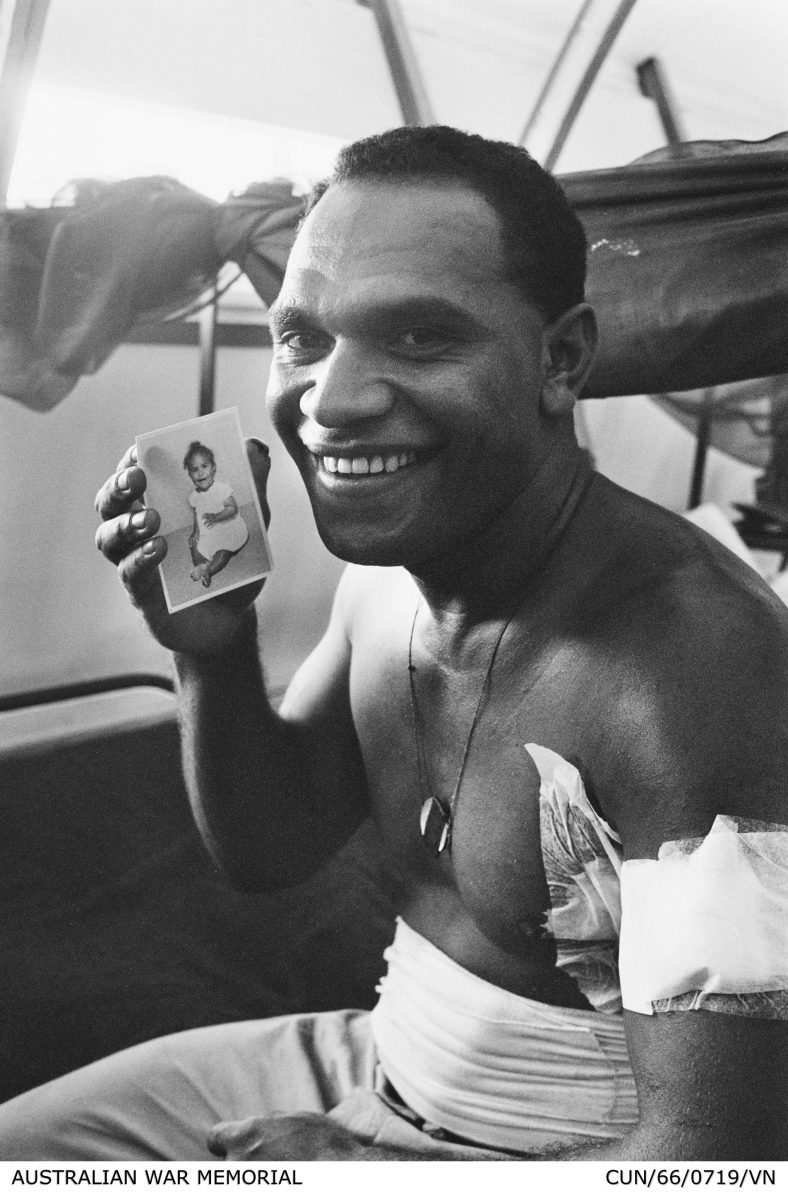
Corporal Thomas Henry ‘Buddy’ Lea, 10 Platoon, D Company, 6RAR, of Brisbane, showing a photograph of his baby from his hospital bed. Corporal Lea was wounded in the battle of Long Tan, shot three times while trying to pull a mate to safety. Photo: The Australian War Memorial.
As many Australians know, Vietnam veterans weren’t given the warmest of welcomes when they returned from the war, so through recognition in the research, they can now enjoy their day in the sun.
“It’s taken me a long time, as a one-man-show, to get this list together,” Mr Bell said of the 250 names of Aboriginal and Torres Strait Islander men and women. “Once you have something like this, you can ask the veterans if they know of others we might not have spoken to yet, their family connections. That was a big thing back then. Lots of people, cousins, brothers and mates all followed a family tradition of service.”
Mr Bell said one of the most satisfying findings of the research was when servicemen and women were asked about their acceptance in the services.
“Overwhelmingly, what we were told was that there was only one colour anyone ever saw, and that was green, the colour of the Australian uniform.”
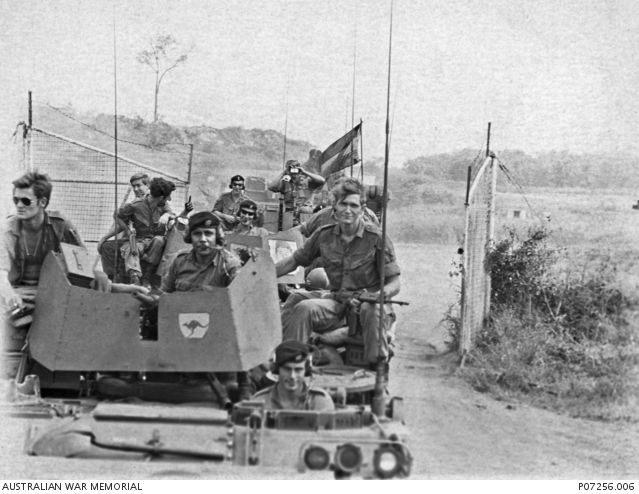
The last Australian troops to leave Nui Dat, on 7 November, 1971. Photo: The Australian War Memorial.
Director of the Australian War Memorial, Matt Anderson, said this research greatly helped our understanding and knowledge of Indigenous service in Vietnam.
“It is part of our ongoing program at the Memorial that deals with identifying and recognising the service and sacrifice of Aboriginal and Torres Strait Islander service people,” he said.
Mr Bell said identifying and researching the contribution made by people of Aboriginal and Torres Strait Islander descent during the Vietnam War remained a work in progress.
“Gathering this list takes many hours of research and we expect to get to 500 names,” he said.
He invited Aboriginal and Torres Strait Islander people with a connection to the Vietnam War to contact the AWM so they could be included in the research.
More information is available on the AWM website.
Original Article published by Sally Hopman on Riotact.






